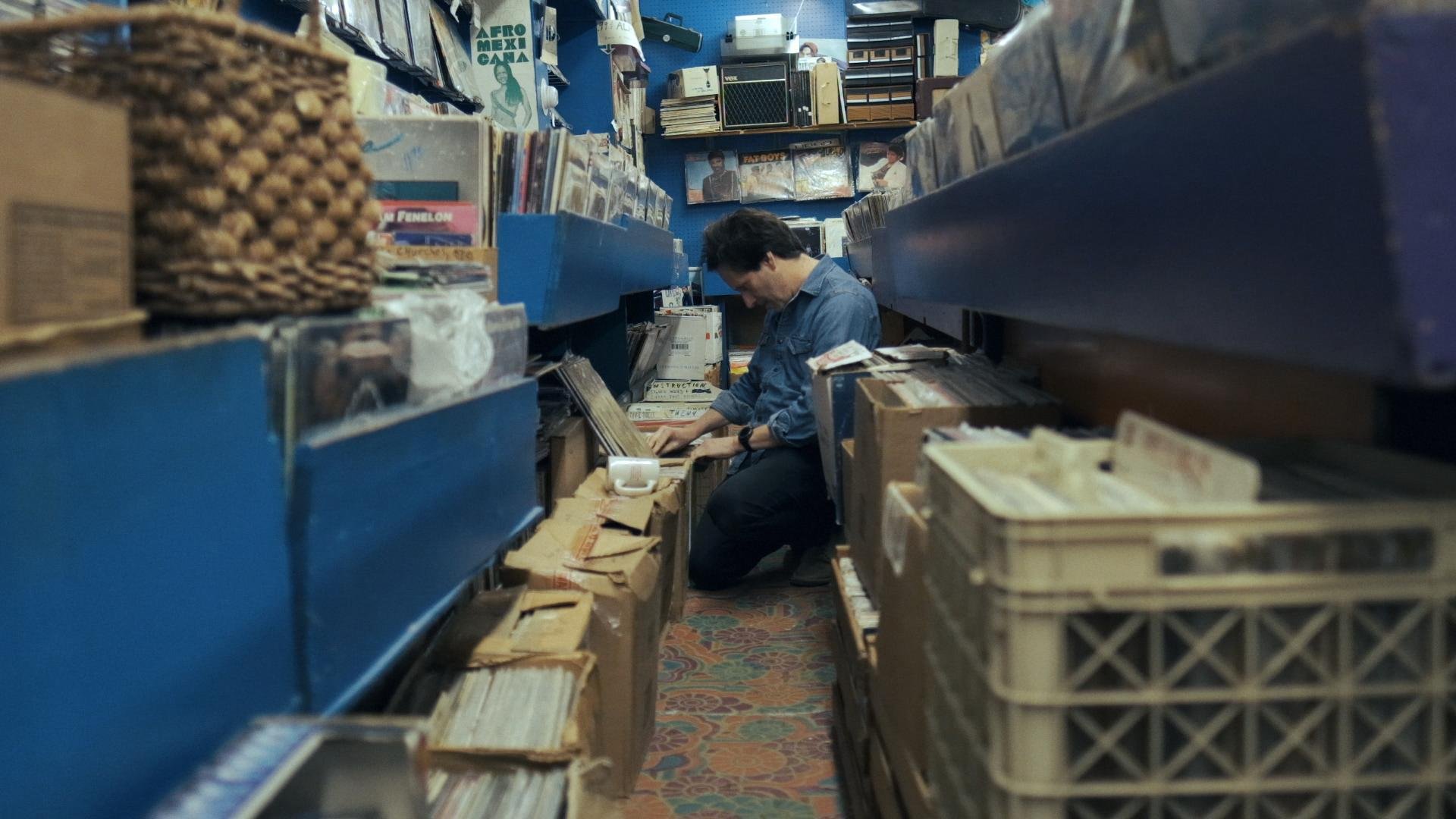“Stopped In Time” | Chris Wilcha, Flipside
Courtesy of Oscilloscope Laboratories.
When filmmaker Chris Wilcha revisits the record store he worked at as a teenager in New Jersey, he finds the once-thriving bastion of music and weirdness from his youth slowly falling apart and out of touch with the times.
Flipside—screening Monday, May 6, at 9:45 p.m. at the Music Box, as part of the Chicago Critics Film Festival (get tickets now)---documents his tragicomic attempt to revive the store while revisiting other documentary projects he has abandoned over the years.
In the process, Wilcha captures This American Life icon Ira Glass in the midst of a creative rebirth, discovers the origin story of David Bowie’s ode to a local New Jersey cable television hero, and uncovers the unlikely connection between jazz photographer Herman Leonard and TV writer David Milch. This disparate collection of stories coheres into something strange and expansive—a moving meditation on music, work, and the sacrifices and satisfaction of trying to live a creative life.
Ahead of Flipside screening at the Chicago Critics Film Festival, Wilcha graciously took the time to answer this year’s CCFF filmmaker questionnaire. Below, his individual responses.
How did you first become interested in filmmaking? What was your path toward directing your first film?
When I was in college, I became obsessed with documentary films. I was not a film student, just an avid fan. I would go to museum screenings, retrospectives or lectures with visiting filmmakers. The documentary world was definitely more cloistered back in the early 1990s. I eventually wanted to try to make a film of my own. As a graduation gift, my parents gave me a hi8 video camera. I brought it with me every day to my first job and documented my experience working in the marketing department at the Columbia House mail order CD and tape club. This footage eventually became my first film, called The Target Shoots First.
What inspired you to make the film you're bringing to the festival?
Mid-pandemic, I spent a bunch of time going through the stacks of Hi8 and miniDV tapes and hard drives of footage I had accumulated over many years. And I rediscovered all of these documentary projects that I had started but never finished. Watching this footage, I realized that much of it had accrued new meaning and significance with the passage of time. I wanted to see if I could assemble a film out of these abandoned projects.
Courtesy of Oscilloscope Laboratories.
Tell us about a film that you consider a guiding influence (whether it has informed your overarching vision as a filmmaker, directly informed the title you're bringing to the festival, or both).
One documentary that immediately comes to mind: I remember seeing Ross McElwee’s film Time Indefinite when it came out in the early 1990s and feeling a “Wait,. this is possible?” sense of surprise. It helped me understand the literary possibilities of first-person nonfiction filmmaking… the aphoristic precision of Ross's voice-over writing, his nuanced structuring of the overall film, the examination of big and profound questions about life, but done with humor and conversational ease, his one-man-band shooting approach—on 16mm film, no less! I learned a lot from that film.
Tell us about a location that's held significance to the film you're bringing to the festival: a setting where filming took place, a geographic area that provided a source of inspiration, or another type of space that comes to mind for you in thinking about the film. What made this place so special?
A key location in my documentary is a store called Flipside Records in Pompton Lakes, New Jersey. I worked there in high school, and it was a very formative experience. In my documentary, I return to Flipside Records and find it stopped in time. While my film is not entirely about this record store, Flipside was definitely the primary inspiration for this film. I truly hope that some people who see my documentary will make a pilgrimage to Flipside, talk to the owner Dan, buy some records, and help keep the store open!
Courtesy of Oscilloscope Laboratories.
The theatrical experience brings us together to celebrate artistic experience and expand our horizons as human beings. Tell us about a memorable theatrical experience from your life.
I will never forget attending a seven-and-a-half-hour screening of Bela Tarr’s film Sátántangó at Anthology Film Archives. Susan Sontag was in the audience. It was an endurance test but, when it was over, me and my fellow filmgoers were elated. A truly memorable experience.
Flipside screens Monday, May 6, at 9:45 p.m, as part of the Chicago Critics Film Festival (May 3–9, at the Music Box Theatre in Chicago). Get your tickets now.


